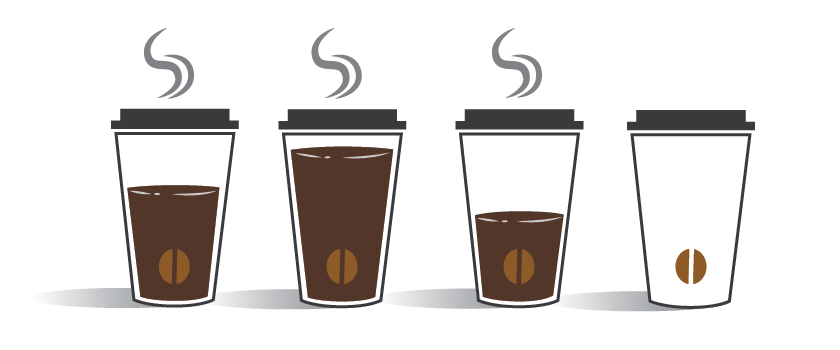48 ounces of coffee was divided between four mathematicians: Albert, Bianca, Carl, and Dmitri. Albert looked at the amounts in his colleagues' mugs and said, "I feel bad about taking this much coffee, as I've already had several cups today." Albert then poured an equal amount of coffee into each of the other three mugs until he had none left.
Bianca cried, "Now I have the same amount you did! This is too much for me - I'm trying to cut back, anyway." She then divided all of the coffee in her mug equally between the other three mugs.
Carl said, "Well now I have what Albert started with. There's no way I'm going to finish all of this." Then Carl shared all of his coffee equally among everyone else.
Dmitri, not wanting to seem greedy, shrugged and performed the same action. When Dmitri was finished, everyone was amazed to see they all had the same amount of coffee in their mug that they started with!

Image is for graphical purposes only and is not representative of the solution.
Solution
Let A, B, C, and D represent how many ounces of coffee Albert, Bianca, Carl, and Dmitri had at the beginning.
We know that A+B+C+D = 48 ounces. We also know that since Dmitri ended with an empty mug, then that's what he started with, D = 0.
At the start, Albert gives A÷3 to each of the others. Thus Bianca now has B+(A÷3) ounces, and we know this is as much coffee as Albert started with. Thus B+(A÷3) = A, which tells us that B = 2A÷3.
At this point, Carl has C+(A÷3) ounces and Dmitri has A÷3. Bianca then gives one third of her current total, which is A, to the others. So Albert now has A÷3, Bianca has 0, Carl has C+(A÷3)+(A÷3) = C+(2A÷3), and Dmitri has (A÷3)+(A÷3) = 2A÷3. We are told that Carl now has what Albert started with. This implies that C+(2A÷3) = A, or C = A÷3.
Albert, Bianca, Carl, and Dmitri now have A÷3, 0, A, and 2A÷3 ounces, respectively. Since the total amount hasn't changed, this implies that A+(2A÷3)+(A÷3) = 48. It follows that A = 24. We then conclude B = 16 and C = 8.
The amount of coffee in each mathematician's cup at the beginning was:
- Albert = 24 ounces
- Bianca = 16 ounces
- Carl = 8 ounces
- Dmitri = 0 ounces
*As a check, we can track the amount of coffee in ounces after each stage:
- Start (A, B, C, D) = (24, 16, 8, 0 ounces).
- After step 1: (Albert, Bianca, Carl, Dmitri) = (0, 24, 16, 8)
- After step 2: (Albert, Bianca, Carl, Dmitri) = (8, 0, 24, 16)
- After step 3: (Albert, Bianca, Carl, Dmitri) = (16, 8, 0, 24)
- After step 4: (Albert, Bianca, Carl, Dmitri) = (24, 16, 8, 0)